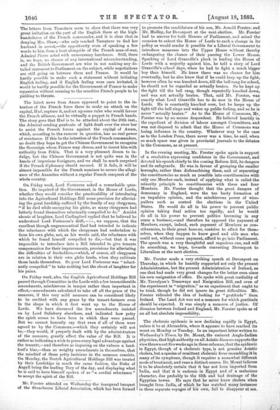In the evening meeting, Mr. Forster spoke again in support
of a resolution expressing confidence in the Government, an& devoted his speech chiefly to the coming Reform Bill, its dangers and its safeguards. He was in favour of grouping the smaller boroughs, rather than disfranchising them, and of separating the constituencies as much as possible into constituencies with only one Member each, instead of applying what is called the- minority principle to constituencies with three and four Members. Mr. Forster thought that the great dangers of democracy in England, were the too hasty formation of an impulsive opinion, and the mischievous power of wire- pullers such as control the elections in the United States. He would do all in his power to prevent public opinion taking final action too rapidly, and he would do all in his power to prevent politics becoming in any sense a business,—and therefore he opposed the payment of Members, except, indeed, such payment of Members as con- stituencies, to their great honour, contrive to effect for them. selves, when they happen to know good and able men who could not, without some payment, afford to go into Parliament. The speech was a very thoughtful and sagacious one, and will do something, we hope, towards converting Devonport to Liberalism at the next election.


































 Previous page
Previous page